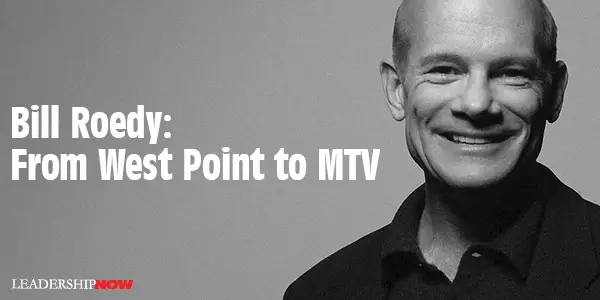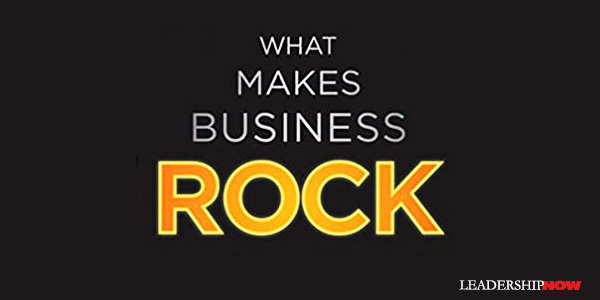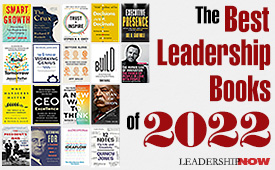 Leading Blog | Posts by Month |
 Leading Blog | Posts by Month |
05.31.11

LeadershipNow 140: May 2011 Compilation
Posted by Michael McKinney at 08:44 AM
05.26.11

5 Leadership Lessons: Redesigning Leadership
JOHN MAEDA is the president of the Rhode Island School of Design. In Redesigning Leadership, he—with co-author Becky Bermont—pulls the leadership lessons from the ups and downs of his time there. In his transition from MIT to RISD he found that the two words “free pizza” were a powerful motivator to convene large numbers of students. “Making people work together can be fairly challenging, but getting them to eat together is somehow vastly easier. A meal is often a catalyst for a conversation that can lead to a collaboration, and a meal is a natural happening to signify closure when the collaboration has been completed.” Leadership is never easy and it is made more difficult by what I perceive is a growing sense of entitlement we all feel in our culture. It’s not all good or bad, but it is something to deal with. Redesigning Leadership is a slim book, but it is full of great thoughts like these:

Posted by Michael McKinney at 09:52 AM
05.24.11

Got Drama?
YOU can’t stop The Drama. There will always be drama. But that’s not the problem says Marlene Chism, author of Stop Workplace Drama. “The amount of time you stay in the drama—and the effort you put toward it—is the problem. Complaints, excuses, and regrets only serve to keep the drama alive.” Your drama—what you add to The Drama—is the problem.Chism defines drama as “any obstacle to your peace and prosperity.” Drama is the result of not recognizing or taking care of the little signs of bigger problems when they first presented themselves. At the core of drama, you will find one of three common elements (if not all three): a lack of clarity, a relationship issue, and/or resistance. So, says Chism, when you experience drama you need to ask yourself three questions: 1. Where am I unclear?
Chism presents eight principles for dealing with drama, but “lack of clarity” struck me as the most common and excuse-laden trap there is. Too often this is where we get stuck.
“Any type of discord, abuse, confusion, or game-playing always boils down to a lack of clarity.” A loss of focus. Sometimes we create drama because we want something on our terms. We imagine that we can’t do something because we can’t do it the way we think it should be done—our way. Chism relates a clarifying example of this with the recently divorced Joe who is having visitation issues with his ex-wife Patty. She’s not letting him do what he wants in the way that he wants. Many people get stuck in the drama of what should or shouldn’t be. Yes, you can fight that battle, if winning a battle is what you want. But again, in order to clear the fog and help Joe get clarity, I asked, “If there are two islands you can go to, and one means winning a battle with your wife and the other island is getting to see your kids and be a father to them—then which island would you choose?” This kind of dynamic plays out every day in our business and personal lives. When we are not clear about what we want, what our values are, what we are committed to, it is easy to lose our focus, to drift off course Solution: Clear the fog. Chism has written a good-natured and practical book that will change your thinking and in the process help you to control the drama in both your personal and professional life. As leaders, we have the responsibility to be very clear with ourselves and our team so that we don’t get pulled into negativity, gossip, power plays, resistance and … drama. Chism suggests asking the following questions: What are my top 10 principle-based values?

Posted by Michael McKinney at 10:00 PM
05.19.11

Landing in the Executive ChairSuccess in any organization requires good decision-making, results orientation, leadership talent and people skills says, Linda Henman in Landing in the Executive Chair. But as you climb the hierarchy in an organization, “the manifestation of those traits and behaviors becomes more complicated.”No matter where you are in the organization, it’s about people. People will make you successful. However, you will find that as you go up the ladder, the need for understanding yourself and others becomes more acute and more difficult. Primarily this is because your relationship with those around you changes—both in your mind and theirs. It’s not surprising that Henman writes, “I have found direct ties between self-awareness, self-regulation, motivation, empathy, social skill—and business results.” As Bill George says, “It's EQ, not IQ, that matters most for leaders.” As a result, Henman has developed a model she calls F² Leadership: Fair but Firm. F² Leaders have a “balanced concern for task accomplishment and people issues.” It’s about balancing dominance (results) and responsiveness (relationships). F² Leaders should keep in mind:
Fairness is in the eye of the beholder, but “you can take steps to stack the deck in your favor.” Henman describes behaviors that indicate that you are firm but fair, and trustworthy. She covers such areas as decision-making and problem-solving, attracting top talent, strategy, execution, leadership development, and building a culture of change. These are valuable insights for both new leaders and experienced leaders alike. 
Posted by Michael McKinney at 09:56 AM
05.17.11

Do You Have a Virus in Your Group?It’s not unusual to find in a group, a person that just doesn’t seem to fit in; someone we would rather do without. Often we find them irritating simply because they are coming from a different perspective—a different agenda—than the rest of the group. While this can be annoying, these people provide a very important service to the group. Consider the experience Rhode Island School of Design president John Maeda relates in Redesigning Leadership:Working in a group where there are considerable differences and disagreements can be a pain. When I was in my twenties I worked at a small foundation in Tokyo. There was one gentleman whom everyone disliked. I asked the director, a wise and esteemed scientist who cofounded one of the largest corporations in Japan, why he didn’t just fire the guy. He gave me a quizzical look, as if that would be idiotic, and then replied, “Well, we need him, because an organization is like the human body. It needs viruses like him so the body can learn how to survive and remain strong.”Abraham Lincoln famously said, "I don't like that man. I must get to know him better." In like manner, Maeda says that after he began speaking with “the virus” more often he began to see his unique value. He had a different background from the rest of the team and therefore brought a different perspective. His point of view helped him to avoid making certain kinds of errors. When we understand the unique value each person brings to the group, we can learn to appreciate the friction that sometime arises—maybe even see it as the learning opportunity it is. The German poet Heinrich Heine once remarked, “Great genius takes shape by contact with another great genius, but less by assimilation than by friction.” Maeda adds, “Learning is said to be most potent when ‘cognitive dissonance’ occurs. Said more simply, we learn best when we are wrong.” Cognitive differences can lead to progress, understanding and wisdom.
Posted by Michael McKinney at 05:57 PM
05.13.11

7 Essential Attributes for Picking Good Leaders
WE complain about our leaders. So we eventually get rid of them and we move on to the next one with the hope that it will be different this time. But it’s not. And we’re back where we started. Jeffrey Cohn and Jay Moran ask Why Are We Bad at Picking Good Leaders? “For starters,” they write, “because selecting the right people can be very, very, hard.” It’s easy to say that if we had better choices, we would pick better leaders. But that means that we are promoting the wrong people through the system. “If the only candidates with experience are simultaneously not qualified to lead, how did they get in the running for leadership positions?” Good question.To me, it’s obvious we are looking for the wrong things in our leaders and the right things are difficult to judge. Often the things that first attract us to a leader are not the attributes that make a good leader in the long term. “The truth is that most of us like a little bit of rock star in our leaders. We respond to their magnetism, their celebrity.” Charisma and smooth talk just aren’t enough.
These seven are the basic building blocks of a leader and other aspects of leadership flow from them. For example, innovation “requires the imagination to conceive of a new vision, the judgment to ensure this vision is practical and can be implemented, the empathy to anticipate how others will react to the new idea and to garner their support, and the courage to stick with a plan despite inevitable bumps in the road.” (They note that because innovation draws on so many of the seven attributes it is a rare quality among many leaders.) They are:
Each attribute is discussed in detail—with examples of leaders who have it and those who don’t—and they suggest practical ways to access their presence in potential leaders—or yourself for that matter. This exercise should help you better understand which aspects of your own leadership might be holding you back and should be addressed. This book is a valuable tool for evaluating the efficacy of your own leadership development program. 
Posted by Michael McKinney at 04:39 PM
05.10.11

Can I Lead? Yes. But…There is a danger in selling leadership to everyone.Serious practitioners of leadership know that there is a lot of work that goes into being a good leader (dictators of any variety, not so much). Competence in your chosen context for leadership aside, the life-long inside work of leadership—figuring out what you won’t do before you figure out what you will do—is sometimes gut-wrenching and sometimes the most thrilling feeling you can experience. Character usually isn’t explicitly stated in the sales pitch. Instead, leadership is quite often seen as a way to be heard, to advance your own agenda and to put yourself out front. It is no surprise that Alan Webber recently wrote in the Washington Post: You will be told that you have a responsibility to be leaders. That what the world needs more than ever are leaders. That we suffer from a lack of leadership. That with your education, your values, your ability to apply social media, your global vision, your youthful idealism, you will be the next generation of leaders!Choosing to lead is one of the most rewarding decisions you may ever make. But it’s not about you. Yes, you will bring your unique and much needed gifts to the world, but not for your own sake. Your job is to use your gifts to help others express, make known and fulfill their potential. Influencing others with a purpose, a calling, and with opportunities they never imagined they had. It’s a mindset of service. It’s a mindset of continual learning. It’s a mindset of growth. The single biggest truth of leadership is that we build who we are by building up others. That doesn’t come naturally to us, but it’s your calling, if you would be a leader.
Posted by Michael McKinney at 03:15 PM
05.09.11

5 Mistakes People Make When Reading Your Body LanguageWhen we communicate there are two conversations going on. Verbal and nonverbal.Our brains are hardwired to respond to nonverbal signals. Unfortunately we often don’t even know how we are reacting to them or how others are reacting to us and therefore are unable to use them to our advantage. This becomes very apparent when we are reacting to nonverbal communication from people from different cultures. Thus what might seem right in one culture may be ineffective or offensive in another. Communications expert Carol Kinsey Goman wrote The Silent Language of Leaders to help us become more aware of the messages we are sending and to better read the signals of others. When there is a disconnect between your verbal and your nonverbal communication, you don’t make sense. People will tend to disregard what you say and focus on what you don’t say. My mother always told me, “It doesn’t matter if what you say is right, if your tone is wrong, then it’s wrong.” Goman would add: “How can sometimes be more revealing of your true meaning than the what contained in the words. Leaders must therefore keep in mind that when they speak, their listeners won’t only be evaluating their words; they will also be automatically ‘reading’ their voices for clues to possible hidden agendas, concealed meanings, disguised emotions, unexpected surprises—anything, in short, that will help determine whether or not they can rely on what they're being told.” Goman defines our nonverbal communication—body language—as the management of time, space, appearance, posture, gesture, vocal prosody, touch, smell, facial expression, and eye contact. Goman says that people look for leaders to project two sets of nonverbal signals—power and authority and warmth and empathy—and it’s important to employ the right signals at the right time. Which means that the body language signals that work so well when announcing a new business strategy are not helpful (and in fact may sabotage your efforts) when building collaborative teams. Successful leaders don’t memorize “the right” physical gestures and facial expressions to display at appropriate times as though they were some kind of preprogrammed robot. But they are aware that their body language dramatically impacts colleagues, clients and staff. They understand that for a variety of reasons, even the most well-meaning behaviors will sometimes be misinterpreted, and they are ever alert to finding authentic ways to align their nonverbal communication with the messages they want to deliver.Reading nonverbal communication can be tricky for a number of reasons. Here are five mistakes people make when reading body language:
When it comes to building collaboration, even the seating arrangement in your office makes a difference. “Seating people directly across from your desk places them in an adversarial position. Instead, place the visitor’s chair at the side of your desk, or create a conversation area (chairs of equal size set around a small table—or at right angles to each other) and send signals of informality, equality, and partnership.” Gorman has made available on her web site, videos and articles to reinforce the material presented in her book. Interestingly, Goman predicts that because of new visual technologies, body language skills will become even more crucial than they are today. Video communication exposes a leader’s body language to evaluation to a greater degree. She also predicts that with the emphasis now on more collaborative structures, a leader’s body language will have to project trust, inclusion and rapport. Look for more Body Language Notes on the LeadershipNow Facebook page. 
Posted by Michael McKinney at 10:04 PM
05.06.11

3 Attributes that Will Help You be Better Under Pressure
JUSTIN MENKES says that there are no longer periods of calm seas for leaders in any industry. So it’s not a matter of gritting your teeth and riding out the crisis. Leaders must get comfortable in an environment of ongoing stress. They must be Better Under Pressure. To do this a leader must possess a “highly unusual set of attributes that often run counter to natural human behavior.” This means leaders must “foster specific attributes to achieve maximum success in themselves and their people. No longer can leaders think of leadership as unidirectional. Instead, leadership “becomes a fluid, virtuous cycle of exchange and growth between leaders and the people they lead.” Menkes writes, “Almost every human being alive today has an underutilized thirst for bettering himself or herself. It is up to leaders to discover how to trigger this thirst—in fact, it is a leader’s most critical responsibility.” Recognizing and developing that thirst is something that must be and can be learned. He identifies three catalysts that will help a leader to realize his or her own potential and the potential of others: Realistic Optimism. Striking a balance between the known and unknown. Kevin Sharer, CEO of Amgen, said, “With all the things that are going on in today’s workplace, if you’re not a little bit self-reflective and self-aware, you’re not going to make it.” And you won’t get the best from your team. Awareness requires humility. Humility allows you to see yourself as you are. It also allows you to see your role in any problem. Realistic optimism creates a sense of agency—the degree to which you believe your circumstances are within your control. “People must recognize how—and that—their own approach to the problem can either exacerbate these obstacles or bridge the space between two parties.” You must learn says Menkes, “to minimize the ways your mind distorts reality.” Subservience to Purpose. While realistic optimism allows leaders to see and address deficiencies in themselves and the world around them, subservience to purpose gives them the drive to do so. In this framework, “people’s level of dedication toward the mission of the enterprise is paramount, rather than their dedication to each other….Hierarchical distinctions are secondary to the overarching value system that considers the company’s noble missions its most important function.” Subservience to purpose means developing affect tolerance or “the ability to channel intense reactions to recurring setbacks in a way that not only avoids hampering you, but also constructively keeps you and your organization moving forward toward maximum potential.” It is vital that a leader understand the outsized effect that their emotional behaviors have on their people. Not managing your emotions and reactions—especially in a stressful environment—will hinder other people’s progress. You must temper the intensity of your responses “with the awareness of the unequal power dynamics you share with your team.” This also means keeping in check your sense of self-importance. Menkes writes: Grandiosity is particularly costly to you as a leader, because its expression unintelligently telegraphs to your subordinates that you believe the group’s accomplishments are largely due to your involvement. This why expressing humility is so important because when you are humble, you clearly communicate to others that you recognize the critical role each team member plays in contributing to the organization’s progress.Fred Smith, founder, chairman, and CEO of FedEx told Menkes: As a founder, you must be able to resist any temptation to let the organization become a cult of personality built around you. FedEx isn’t about me. When I walk out the door here, this organization won’t miss a beat.” How many can (want to) say that? Finding Order in Chaos. This attribute is about maintaining clarity of thought and a drive to solve the puzzle. Maintaining clarity of thought is developed by learning how to manage your stress in such a way that it fuels your focus and increases your clarity. To do this, one must seek out experiences that support your sense of competence under duress—“managing adrenaline without panic and gaining confidence that the sensations that stress induces will not lead to collapse.” The drive to solve the puzzle “manifests itself as an intense intellectual curiosity…and a pleasure in finding solutions to them.” Menkes adds, “The positive feedback we get from maintaining clarity under pressure gives us a thirst for more situations that involve pressure, and we are thus driven to solve the puzzle.”
Importantly, Menkes reminds us, “people do not act as isolated entities, but are reflections of an essential interaction between themselves and the context in which they are placed….A person’s potential can only emerge as an active process, consciously cultivated through a fluid, ongoing exchange between leaders and their people.” It serves to remind us of the privilege and huge responsibility leadership truly is. To see leadership primarily as a function of authority, is to totally miss the mark. I’ve only offered an overview of the ideas Menkes presents here. There are so many more insights in this book than can be provided here. But reading the examples of those who exemplify theses attributes and those who haven’t, coupled with the interviews of 25 leaders, you will come away with a sense of where you stand and a confidence that you can improve in any area you identify. 
Posted by Michael McKinney at 05:13 PM
05.05.11

Bill Roedy: From West Point to MTV
BILL ROEDY, former Chairman and CEO of MTV Networks International, began working for HBO in 1979 when it was broadcasting only nine hours a day. There he learned that distribution was everything. It was to be his mantra at MTV—aggressive, creative, relentless distribution. Roedy shares his experiences and lessons in What Makes Business Rock. From virtually nothing, he built MTV International into the largest media network in the world. For anyone involved doing business internationally, it is essential reading. As manager of HBO’s national accounts, he learned that “In life as well as in business, the ability to sell is the foundation upon which success is built.” Some people don’t understand that he says, but even in Vietnam, although he had the formal authority to force troops to obey my orders, I found that if people didn’t believe in the mission, I never got a total effort from them.” Leaders are always selling. Although reluctant to leave HBO and move to London, in 1989 he became managing director of MTV Europe. What he inherited wasn’t working. He had to quickly create a better product, get more distribution and generate revenue. Getting the right people in place was crucial to creating an entrepreneurial organization. “Never take ‘No’ for an answer.” “Take chances.” “Break all the rules.” Their objective was to be the most visually engaging channel in the history of European television. To make sure viewers always knew they were watching MTV, they put their logo in the corner of the screen and left it there. No one had done that before. (Now everyone does.) Here is a lesson every leader could bear to keep in mind: as a leader, your opinion matters—maybe more than you know. But it can actually be having a negative impact. The MTV playlist is extremely important to its viewers and giving them what they want to hear is essential to MTV’s survival. Roedy says that in the beginning, he attended those meetings if only to be the voice of reason and a subtle reminder that they were running a business. “But after attending half a dozen of these meetings I realized I was making a huge mistake. I was much older than our demographic and my musical tastes were very different. I was skewing the choices older.” So he stopped attending those meetings. “As much as I enjoyed being part of that process, I had to remind myself that I was a manager, and I had to delegate decision-making authority to those people I trusted.” How many leaders, for all kinds of well-intentioned reasons feel they have to leave their fingerprint on everything, while they are in-fact stifling their people and skewing the results? Roedy’s success at MTV can be attributed to the fact that he was always reinventing. “The longer you stay with the same strategy, the more vulnerable you become to your competitors.” His most important contribution was the idea, “Think global, act local.” MTV was already local to Europe, but it had to be broken down to the national level, country by country. “Learn the local culture and reflect it in every decision we make,” was their business strategy. He created a structure similar to what he learned in the military: small operating units in the field fighting the competition. “My belief was that the local people would best reflect the needs, tastes, and desires of the local audience, and because their jobs would depend on the bottom line, they were much less likely to make risky or destructive financial decisions. In Vietnam, I had seen over and over the benefits of dealing directly with the loyal population on their own terms, rather than trying to impose our beliefs on them.” Because of the complexities of operating an international business, you need be there on the ground to really feel it. On MTV Arabia for example, they broadcast the call to prayer on the channel five times every day. For Ramadan, they produced an animated film explaining the meaning of that important religious holiday to young people in a creative way and refrained for a month from showing any music videos. Throughout the book there are stories of music celebrities—singing karaoke with Bono and Bob Geldof dressed as a nurse in Tokyo at 4 a.m.—and others like Sumner Redstone, Robert Maxwell, Jeff Bewkes, Nelson Mandela, Jiang Zemin, Fidel Castro, Tony Blair, and the Dalai Lama. They add color to the book and make it all the more interesting. But read it for the insights into global business. 
Posted by Michael McKinney at 01:28 PM
05.04.11

What Makes Business Rock
AFTER reading What Makes Business Rock by Bill Roedy, I have developed an appreciation for what it took to build MTV Networks International into what it is today. Former Chairman and CEO, Bill Roedy, has had a remarkable career. Due to financial constraints, he followed his Dad into West Point. Not his first choice. He became a member of the “Century Club” collecting more than a hundred hours of punishment duty. But he did learn the “difference between fighting the system and finessing it.” He also learned many of the skills that would enable him to succeed in business, including “discipline, time management, the value of teamwork, and the importance of physical endurance.” He learned how to prioritize. Survival depended on it. “Too often,” writes Roedy, “I have seen people focusing on the wrong things—things that are not going to directly or immediately affect their business….Leaders need to learn to cut through the chaff to determine priorities and to identify the real target.” After West Point he served in Vietnam in various command positions. “I learned the importance of making quick and firm decisions, communicating those decisions clearly to my troops, and then doing anything and everything necessary to implement them. I learned the importance of building morale, camaraderie, and a team spirit. I learned how to deal with the chain of command and how to get around it when necessary.” From Vietnam he went to Northern Italy where he spent four years in command of three NATO nuclear missile bases. A good place to learn how to deal with pressure and stress. “There are few situations more stressful than commanding a nuclear missile site and trying to determine in 30 seconds whether the aircraft approaching the base was a friend or foe. There was no margin for error. We had to be perfect every day.” Wanting to go into business, he resigned the military after 11 years and went to Harvard to get an MBA. As a child, Bill was so enthralled by the power of television that he would memorize the TV Guide and recite the schedule back to his mother. He knew he wanted to work in television so instead of the typical corporate route followed by his classmates, he took a job at a small start-up cable network called HBO. Roedy’s background doesn’t make him the likely candidate to build MTV International, but it certainly prepared him for it. More on that tomorrow. 
Posted by Michael McKinney at 11:46 PM
05.01.11

First Look: Leadership Books for May 2011Here's a look at some of the best leadership books to be released in May.




For bulk orders call 1-800-423-8273  Build your leadership library with these specials on over 155 titles. All titles are at least 40% off the list price and are available only in limited quantities. “To read is to fly: it is to soar to a point of vantage which gives a view over wide terrains of history, human variety, ideas, shared experience and the fruits of many inquiries.” —A C Grayling, Financial Times
Posted by Michael McKinney at 08:24 PM
|
BUILD YOUR KNOWLEDGE


How to Do Your Start-Up Right STRAIGHT TALK FOR START-UPS 
Grow Your Leadership Skills NEW AND UPCOMING LEADERSHIP BOOKS 
Leadership Minute BITE-SIZE CONCEPTS YOU CAN CHEW ON 
Classic Leadership Books BOOKS TO READ BEFORE YOU LEAD |
|